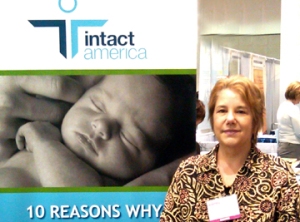As I write this, I am in Rotterdam (the Netherlands), where tomorrow Marilyn Milos (from NOCIRC) and I will be attending a meeting on infant circumcision, sponsored by the Royal Dutch Medical Association (KNMG). The KNMG, as well as physician organizations from other European countries, are increasingly adopting the position that circumcising children is a bodily assault and a violation of their rights. Yesterday’s German court decision is excellent—in terms of timing and, of course, substance.
Every website that has posted the news is garnering hundreds, even thousands, of comments, this Huffington Post piece being just one example. On the pro-decision side are those who decry forced circumcision as infringing on children’s rights to bodily autonomy. Those who oppose the German court decision defend infant and child circumcision as the right of parents to practice their religion.
One of the functions of law in a civil democracy is to promulgate a uniform code of conduct. In a pluralistic society, when certain religious practices contradict or violate this code, or the rights of one individual or group interferes with or breaches the rights of another, the law (and any court that upholds it) provides guidance and—it is hoped—protects potential victims’ rights by prohibiting any such harmful practices.
There is no question that, but for the “freedom of religion” claim, holding down a baby boy and cutting off part of his penis constitutes a forcible physical and sexual assault, with visible and permanent consequences. Defending this practice by relying on a literal interpretation of a religious text ignores the fact that democratic law—while tolerating diverse beliefs—must protect those who cannot protect themselves. To label, or even suggest, that those who would protect babies from harm are anti-Semitic (or anti-Muslim) is a tactic of pure intimidation.
Another less explicitly religious—but equally problematic—defense of circumcision relies on parental intent. “We do it for the baby’s own good” (so he’ll be cleaner, so he’ll find a wife, so he won’t be laughed at, etc.). Sorry. The fact that parents who seek to have their children circumcised may have “benign” motives is irrelevant if the custom inflicts harm on the child.
Cultures or particular groups of people who favor corporal punishment defend it as a legitimate form of shaping behavior, but the courts in countries that recognize individual rights don’t buy this rationale. Cultures too numerous to mention condone child-beating and wife-beating as a means of encouraging better behavior in the future. Individuals from those cultures can believe what they want, but if they live in the United States, they are subject to U.S. law, and will be prosecuted for child abuse or “domestic violence” if they violate the law. Professed non-malignant motives don’t justify acts deemed to harm others.
A huge exception has been the circumcision of children. In the U.S., the fact that doctors adopted the practice as a way of making money (using a series of spurious and serially discredited medical rationales) has served for too long as a cover for religious groups claiming circumcision as their right under religious freedom.
Let us hope that the advocacy of European physicians to abolish infant circumcision, and the court ruling handed down in Germany this week, will lead to a change of consciousness with regard to the rights of children among American physicians and religious groups. The law will—as always—follow suit.
Georganne Chapin



